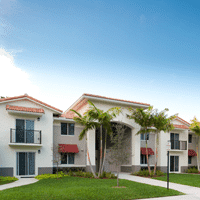The thought of public housing often conjures images of aging high-rises or unsightly collections of squat concrete buildings. Numerous conversations have been held about how to design the most sustainable—in all senses of the word—affordable housing. Which is where the Housing Authority of the City of Fort Lauderdale (HACFL) comes in. The organization is working to change public perception and is incorporating green building in the process.
HACFL initially delved into green building with Dixie Court, a project for which the funders requested Energy Star certification, and as the organization embarked on its latest endeavors, Northwest Gardens and Kennedy Homes, it realized that LEED-ND status was within reach.
According to Scott Strawbridge, HACFL’s director of development, the decision to move in this direction unfolded over time. “It wasn’t really a moment in time as much as the evolution of a process,” Strawbridge says of the project. “Now, we just don’t see how we could do it any other way.” Northwest Gardens is a four-phase apartment-and-townhome community that will offer nearly 600 LEED-certified residential units upon completion (expected in late 2013). The Kennedy Homes project, completed in fall 2012, is an update of a complex originally built in 1938, listed on the National Register of Historic Places due to its roots as an all-white housing project in the segregated South.
Residents must be either low-income or very low-income, earning 60 percent or 28 percent, respectively, of the area’s median income, which is $62,600. Some units are reserved for seniors, and some of those are designed to meet the unique needs of grandparents raising grandchildren. On all three projects, the housing organization partnered with the Miami-based Carlisle Development Group. “We constantly look for ways to conserve resources and reduce our impact on the environment,” says Kenneth Naylor, Carlisle’s chief operating officer. “As a result, we’ve been able to set a number of new green-building standards for our affordable-housing communities.”

The trees provide shade and curb appeal, but at some HACFL developments, fruit trees provide connection to the Earth and an opportunity for earned income. Photos: Fernando Lezcano
Of course, buildings include green features such as efficient building envelopes, high-performance windows and dual-flush toilets, and civil engineering firm HSQ Group promoted eco-conscious infrastructure. For HACFL, though, sustainability is a multifaceted affair. “We’re turning our affordable housing into economically sustainable housing,” Strawbridge says. “Economic sustainability is often a forgotten part of the equation.”
That sentiment is reflected in HACFL’s Step-Up Apprenticeship Program, which was established in 1994. The program, which is funded by a grant from the Department of Labor, provides community residents with 4,288 hours of field and classroom training in construction. It also offers GED courses on-site.
The Step-Up program also serves as a training site for the National Center for Construction Education and Research, and it offers experience in all the trades, from landscape design to cabinetry, and according to Strawbridge, four Step-Up grads have been inspired to pursue LEED Green Associate credentials concurrently with their GED. Individuals who pass the exam will be rewarded with a scholarship to the USGBC’s annual conference, Greenbuild (p. 25), which is held in San Francisco this year. Strawbridge says the hands-on experience is vital. “We don’t just give them a certificate,” he says. “We give them a resume.”
One Step-Up participant boosted that resume by working on an agricultural project in Ghana, an effort that eventually earned her a place among Google’s Young Minds. Not only are Step-Up participants able to make a material contribution to their communities, they’re also generating income to sustain the program. Strawbridge notes that Step-Up gets 85 percent of its funding from earned income.
One avenue for that income is the organic vegetable garden containers and tropical fruit trees that are integrated into social and green spaces throughout the communities, which present another vehicle for social enterprise. Stands are staffed, and fruits and vegetables are sold to residents at a discount. “Sustainability for our communities,” Strawbridge says, “means economic self-sufficiency for our residents.”

